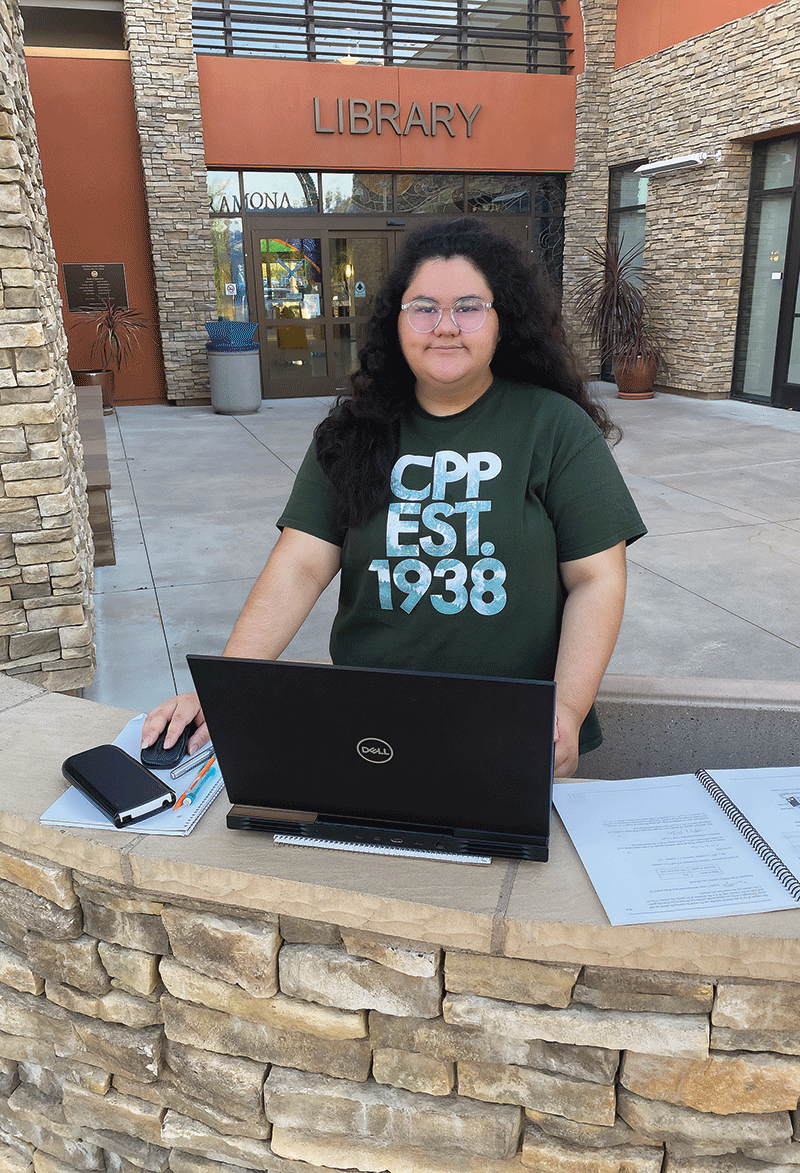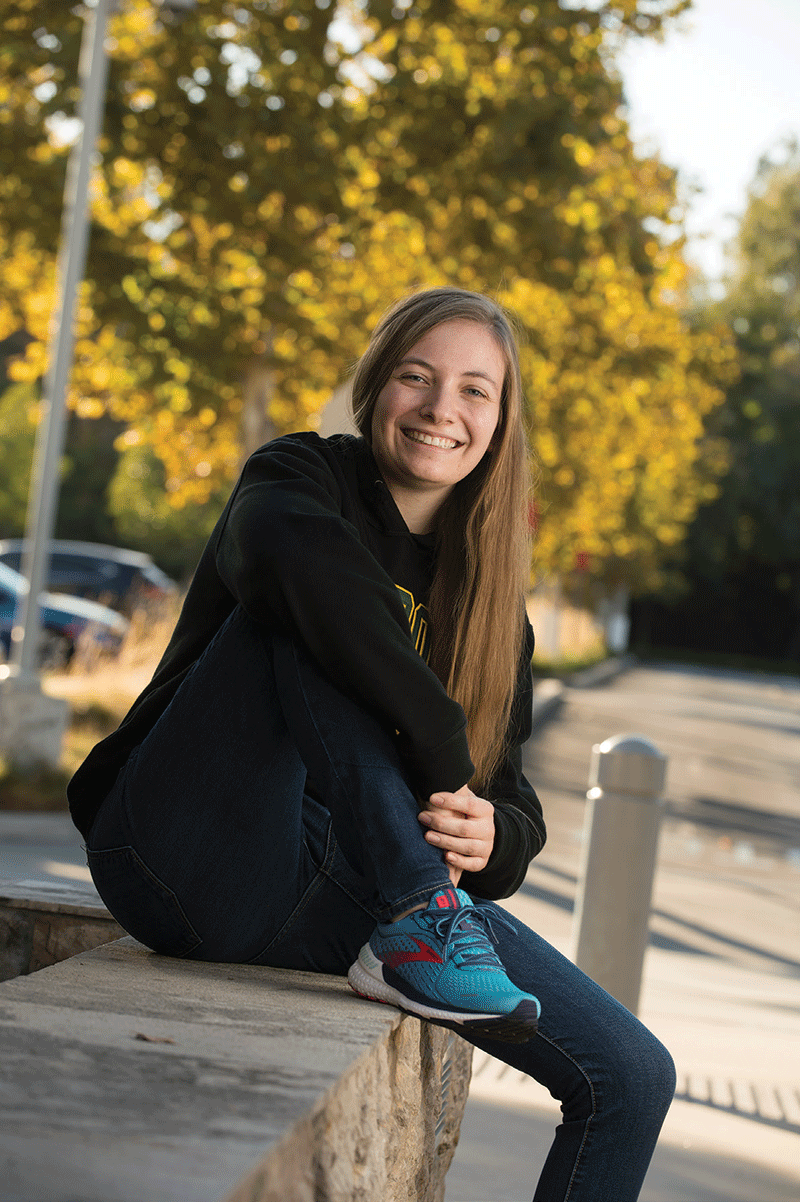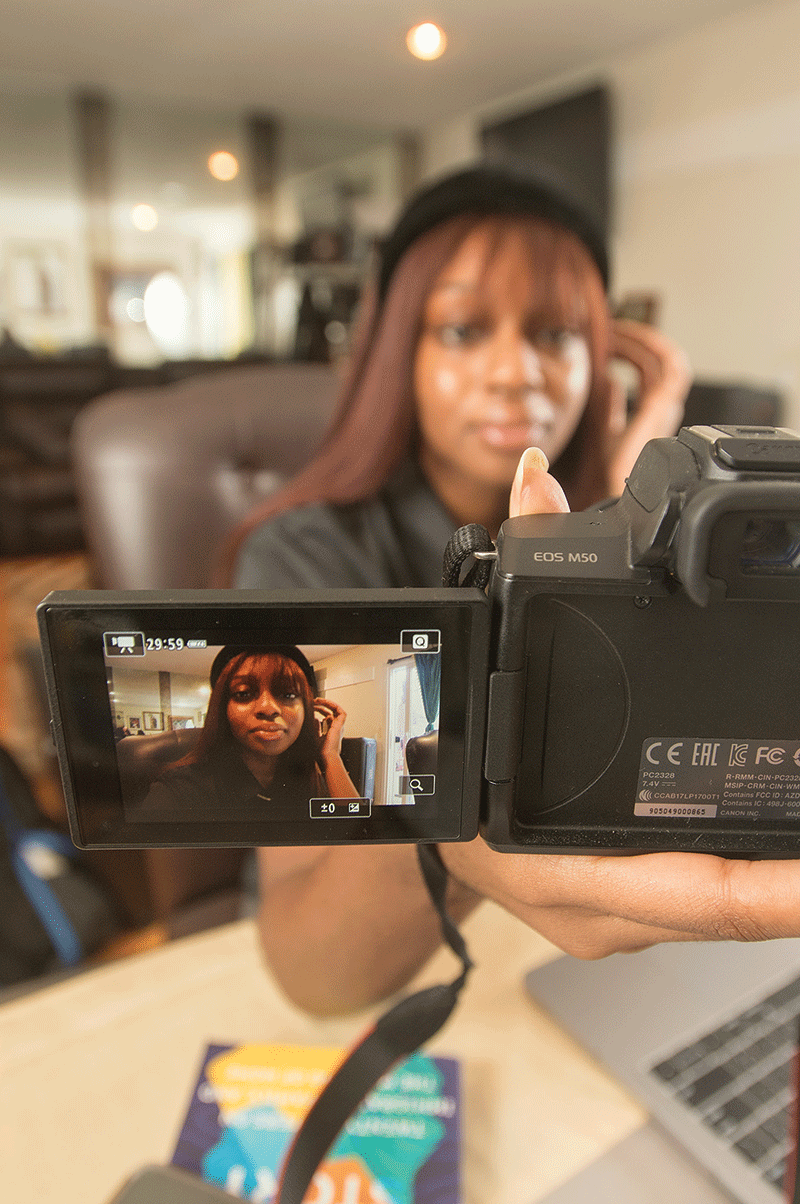Paving The Way to Financial Security
By Melanie Johnson
The financial road to degree completion is not an easy one for many Cal Poly Pomona students.
But at CPP, student success isn’t just an individual goal. It is a collective effort, and donors play an enormous role in ensuring that students get the foundation they need to succeed in a career and life with as little debt and financial distractions as possible.
For the 2020-21 fiscal year, around $2.95 million was awarded in scholarships and, of that, $2.1 million came from scholarship funds created with philanthropic gifts. About 70 percent of the university’s students receive financial aid, with 44 percent awarded Pell grants and 22 percent taking on federal loans.
Cal Poly Pomona donors, whether they create an endowment or chip in a little bit at a time with a payroll deduction, make a tremendous difference in the lives of students.
Leveling the Playing Field
 In high school, Brianna Argueta joined a campus club with a direct link to Cal Poly Pomona.
In high school, Brianna Argueta joined a campus club with a direct link to Cal Poly Pomona.
That club was The Femineer Program, which the university’s College of Engineering created in 2013 with the help of a Kellogg Legacy Grant to encourage young women to pursue careers in STEM (science, technology, engineering and mathematics).
So, when Argueta was accepted to Cal Poly Pomona, she was thrilled and pleasantly surprised that she got into the school she so fondly remembered visiting during a high school trip.
“When I got in, I was kind of in shock because I have a little bit of imposter syndrome,” says Argueta, a first-generation college student from Ramona, near San Diego.
During the college application process, Argueta came across the university’s Scholarship Fest campaign, which encourages students to apply for CPP, CSU and external scholarships. This year, Argueta received The Bridget and Michael Beckage Scholarship for Cal Poly Pomona Women in Engineering — a $5,000 award.
“This scholarship gives me peace of mind this year,” says Argueta, now a sophomore studying electromechanical engineering systems technology and who hopes to make a positive impact in the world and in STEM, particularly for women of color. “It has literally kept me out of going into student debt. As soon as I got the scholarship, I told my parents, and I could see them letting out a sigh of relief.”
Many people have grappled with the economic fallout from COVID-19, including Argueta’s family. “My parents try to help as much as they can, but it is tough,” she adds.
This is the first year that the two annual Beckage Scholarships have been awarded. Alumnus Michael Beckage (’87, engineering technology), one of the founders of Seal Beach-based Diversified Technical Systems, a manufacturer of data acquisition systems and sensors for product and safety testing, and his wife Bridget, a retired teacher, created a $50,000 scholarship endowment in early 2021.
“We both believe that education is really the top priority in our lives and should be the top priority in our culture to give young people an opportunity to just get smarter at whatever field they choose and whatever excites them,” he says.
Beckage recalls struggling financially when he was a college student.
“When I went to Cal Poly Pomona, I didn’t have a lot of money and really no support,” he says. “I took out a $2,000 loan at one point. That doesn’t seem like a lot of money by today’s standards, but when you can’t come up with it, you can’t come up with it.”
Beckage says he and his wife designated the scholarships for women in STEM to encourage diversity in engineering and to help level the playing field for women engineers.
Helping Students Get To The Finish Line
 The Beckage scholarships are among several granted through Cal Poly Pomona’s Women in Science and Engineering (WISE) program. Donations come from individual donors, foundations and corporations, with scholarship awards ranging from $500 to $5,000.
The Beckage scholarships are among several granted through Cal Poly Pomona’s Women in Science and Engineering (WISE) program. Donations come from individual donors, foundations and corporations, with scholarship awards ranging from $500 to $5,000.
“Being that we’re primarily a commuter school and with some of the areas we serve, some students really struggle to stay here,” says Nicole Gutze, outreach liaison and program coordinator for WISE, which supports the colleges of science, engineering and agriculture.
“They take multiple jobs. So maybe $500 doesn’t seem like a lot, but if it pays for your books so you can work a little less and spend more time on your studies, that is beneficial. That means students can be more successful at Cal Poly Pomona.”
For Briana Rittel, a computer engineering junior, the $500 Lockheed Martin scholarships she received through WISE in 2020 and 2021 came in handy for books and lab materials and allayed many of her fears about covering costs.
She recalls spending $250 for an extra circuit board she needed for a lab. Her scholarship helped.
“Scholarships help me not stress so much about tuition and other costs and they help alleviate the pressure, so I can afford textbooks and lab equipment,” Rittel says.
For as long as she can remember, the Chino Hills native has had a fascination with computers. In high school, she took an engineering class and knew she found a way to put her love of CAD (computer-aided design) and circuit boards to use. Attending Cal Poly Pomona was the natural choice, given the campus’ top rankings in engineering and location close to home.
“It’s been amazing,” she says. “I absolutely love my department. They have been so responsive, and my professors blow me away with their knowledge.”
Over the years, Rittel has received several scholarships, enabling her to concentrate on her studies and prepare for her future career in the computer technology industry.
“I don’t have to worry about my financial situation, so I have time to focus on searching for internships,” she says. “I am extremely grateful.”
Culture of Support
 In high school, Precious Chibueze applied to Cal Poly Pomona and was accepted, but one thing kept her from attending — a lack of financial resources.
In high school, Precious Chibueze applied to Cal Poly Pomona and was accepted, but one thing kept her from attending — a lack of financial resources.
Instead, Chibueze attended Los Angeles Harbor College for a couple of years before transferring to CPP in 2019. After the college application process, the last thing she wanted to do was to write more essays for scholarships, but one of her mentors encouraged her to pen one for a Black Faculty and Staff Association (BFSA) scholarship.
Chibueze, a visual communication design senior, received $1,500 this year, a gift that was much needed in the wake of COVID-19. The global pandemic put a financial strain on her family, and some of the money she had set aside for school went to family bills and other household expenses.
“Regardless of what you’re studying, you will always have needs, especially last year with COVID,” she says. “With most of my money going to help my family, how would I pay for classes? Scholarships are a really big help.”
Olukemi Sawyerr, associate vice president for Academic Innovation, knows the importance of scholarships first-hand. She got through undergraduate and graduate school because of the financial support from donors.
“I got scholarships as a student, and they meant a lot to me,” Sawyerr says. “They were recognition of my academic performance and financial support.”
She recalls how proud her parents were and still has the article announcing one of her scholarships that ran in her hometown newspaper in Denton, Texas.
Motivated to pay it forward, Sawyerr set up a monthly payroll deduction to support the Black Faculty and Staff Association’s scholarship fund.
“African American students on our campus are really a minority, so I feel compelled that we provide opportunities for them to come here,” she says. “I appreciate what the BFSA is doing to make our African American students feel welcomed and that they belong.”
Chibueze, an aspiring web and app developer, says she can feel the support from her professors and mentors at Cal Poly Pomona. She herself works as a mentor to incoming freshman and transfer students for the African American Student Center.
“I enjoy being able to work on projects, projects you’re going to use in the real world, not just something hypothetical,” she says. “I love learn by doing. My teachers have made sure that they have embossed that in their curriculum.”
